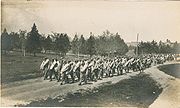
March to the Brazos
Encyclopedia

March of Dimes
The March of Dimes Foundation is a United States nonprofit organization that works to improve the health of mothers and babies.-Organization:...
in the United States, and raised over $1.5 million between 1977 and 2007. The annual event is organized and comprised completely of members of the Corps of Cadets at Texas A&M University
Texas A&M University
Texas A&M University is a coeducational public research university located in College Station, Texas . It is the flagship institution of the Texas A&M University System. The sixth-largest university in the United States, A&M's enrollment for Fall 2011 was over 50,000 for the first time in school...
. In the spring semester, the cadets conduct a 18 miles (29 km) round-trip road march starting from their dorms in the Quadrangle, through Main Campus and West Campus to Texas A&M's Animal Science Teaching, Research & Extension Complex (ASTREC) near the east bank of the Brazos River
Brazos River
The Brazos River, called the Rio de los Brazos de Dios by early Spanish explorers , is the longest river in Texas and the 11th longest river in the United States at from its source at the head of Blackwater Draw, Curry County, New Mexico to its mouth at the Gulf of Mexico with a drainage...
. After the first leg of the march, cadets participate in various competitions (tug-of-war, relay races, etc.), eat lunch, and un-officially transfer ranks for the following school year. The day concludes with the march back under the leadership of the next Class, while the Class of the current year will ride buses back to campus.
History
On April 1, 1908 the cadets of Texas A&M College went on strike and did not attend classes on that day. This action, along with other April Fool’s Day pranks, was becoming a little too regular occurrence for the Commandant. The next year the Commandant issued General Order No. 27 and began what became known as the “Hike to the Brazos” and eventually the “March to the Brazos.” The hike originated in 1909 and was held March 31 through April 1 to keep the cadets from playing April Fool’s jokes on each other and their instructors. This tradition was held annually until 1912 at which point it was discontinued.March to the Brazos was revived in 1977 when cadet leadership saw the natural tie between March to the Brazos and the March of Dimes. This special partnership was seen as a way to build Corps spirit and also benefit a very worthwhile charity. From 1977 through 2003, the event raised a total of $1.3 million, with $130,000 raised in 2003 alone. March to the Brazos is the largest and most successful student-led fundraiser for the March of Dimes in the United States.

